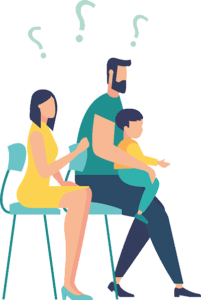I-PCIT: When Help Is Needed Now
Mark Katz, PhD
Attention Magazine August 2021
Download PDF
 For parents of preschool-age children prone to behavior that is very hard to manage, many experts currently recommend Parent-Child Interaction Therapy, or PCIT, as an effective treatment intervention. Among them is Paulo Graziano, PhD, a PCIT practitioner who is an associate professor at Florida International University. He notes that PCIT sessions generally occur weekly, however, and some parents find the stress level at home so intense that they can’t wait that long. “They need help now,” he says.
For parents of preschool-age children prone to behavior that is very hard to manage, many experts currently recommend Parent-Child Interaction Therapy, or PCIT, as an effective treatment intervention. Among them is Paulo Graziano, PhD, a PCIT practitioner who is an associate professor at Florida International University. He notes that PCIT sessions generally occur weekly, however, and some parents find the stress level at home so intense that they can’t wait that long. “They need help now,” he says.
To provide a remedy, Dr. Graziano and his colleagues at FIU’s Center for Children and Families developed Intensive Parent-Child Interaction Therapy, or I-PCIT. The program occurs daily for two consecutive weeks. And, according to a recently published study of its effectiveness, most of the same benefits reported in the more traditional weekly version seem to accrue. A more complete description of I-PCIT will be provided shortly. First, though, let’s begin with a brief overview of the original intervention.
What is PCIT?
During PCIT sessions, the parent or caregiver and child are in a playroom while the PCIT therapist is in an adjoining observation room observing the parent-child interactions through a one-way mirror or live video feed. The parent wears a listening device, allowing the therapist to coach the parent in skills to help manage the child’s behavior. The coaching is occurring in the moment, or what Dr. Russell Barkley refers to as “the point of performance.”
PCIT is divided into two treatment phases. The first phase focuses on implementing skills designed to help children feel a sense of calmness, warmth, and connection with a parent. The second phase is designed to equip parents with specific strategies shown to help children learn to accept limits, behave appropriately in public, respect house rules, and comply with directions. Parents are also expected to complete daily five to ten minute homework assignments between sessions.
PCIT is mastery-based. Treatment is considered complete once parents have mastered both phases of treatment and rate their child’s behavior as normal on behavioral rating scales. On average, parents have completed the program within twelve to twenty sessions. The program was designed initially for children between the ages of two through seven, but some PCIT practitioners find that the program can, on occasion, also help slightly older children as well. Interested readers can learn more at http://www.pcit.org.
How does the more intensive version work?
 Realizing the number of parents who need more immediate help for an out-of-control preschooler, Dr. Graziano and his colleagues designed a more intensive version of PCIT, where sessions occur daily, Monday through Friday, for two consecutive weeks.
Realizing the number of parents who need more immediate help for an out-of-control preschooler, Dr. Graziano and his colleagues designed a more intensive version of PCIT, where sessions occur daily, Monday through Friday, for two consecutive weeks.
Based on feedback from parents involved in the intensive program, the approach appears to be effective. The recent study by Graziano and colleagues referenced above showed I-PCIT to yield most of the same positive outcomes reported in a lengthier version of PCIT, where sessions are conducted weekly for ten consecutive weeks, albeit not mastery-based. Most importantly, these positive outcomes maintained even six to nine months after the program ended. According to Dr. Graziano, another advantage to the shorter, more intensive version is that fewer families drop out of the program.
Dr. Graziano and his colleagues are committed to helping parents whose stress levels require more immediate help and faster relief than many outpatient treatment models can provide. They developed and continue to refine I-PCIT, while pointing out that it may also be a more cost-effective option for families compared to a more traditional approach.
Readers interested in learning more about their work can reach Dr. Graziano directly at pgrazian@fiu.edu or visit his lab website, https://self-regulationlab.fiu.edu.
 A clinical and consulting psychologist, Mark Katz, PhD, is the director of Learning Development Services, an educational, psychological, and neuropsychological center in San Diego, California. As a contributing editor to Attention magazine, he writes the Promising Practices column and serves on the editorial advisory board. He is also a former member of CHADD’s professional advisory board and a recipient of the CHADD Hall of Fame Award.
A clinical and consulting psychologist, Mark Katz, PhD, is the director of Learning Development Services, an educational, psychological, and neuropsychological center in San Diego, California. As a contributing editor to Attention magazine, he writes the Promising Practices column and serves on the editorial advisory board. He is also a former member of CHADD’s professional advisory board and a recipient of the CHADD Hall of Fame Award.
ADDITIONAL READING
Graziano PA, Ros-Demarize R, and Hare MM. (2020). Condensing parent training: A randomized trial comparing the efficacy of a briefer, more intensive version of Parent-Child Interaction Therapy (I-PCIT). Journal of Consulting and Clinical Psychology, 88(7), 669–679. https://doi.org/10.1037/ccp0000504
Other Articles in this Edition
I-PCIT: When Help Is Needed Now
ADHD and Healthy Lifestyle Behavior
Coping with and Recovering from the Pandemic: Key School Issues for Kids with ADHD
Calling All Students, We Need You!
Tracking Homework Assignments: Why Students with ADHD Struggle
The Gender Myths
(Or “Only Boys Have ADHD”)
The Myth of ADHD Overdiagnosis
The Parent As If They Are Younger Myth
